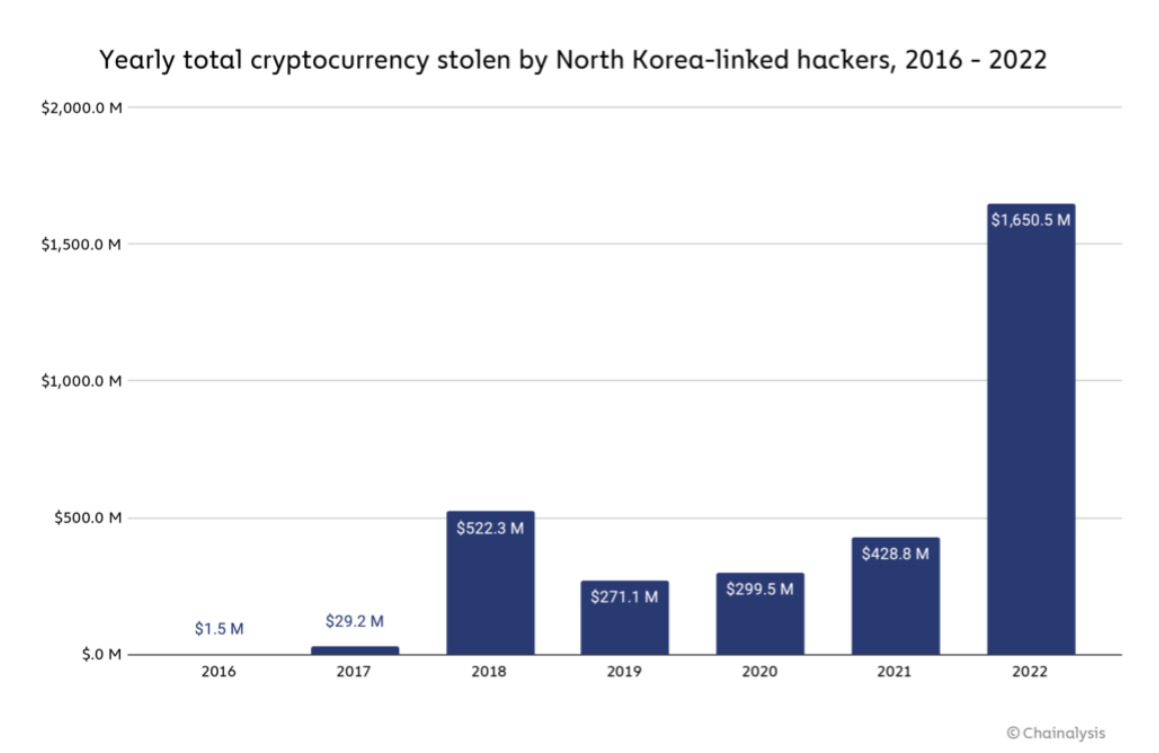
- A United Nations report seen by Reuters said that North Korean hackers stole more crypto assets in 2022 than any other year.
- North Korea-linked groups like Lazarus Group, Kimsuky, and Andariel stole between $630 million and $1 billion worth of crypto assets.
- North Korea uses the stolen funds to finance its weapons programs.
- The UN report said that North Korean hackers are using more sophisticated hacking methods, making tracking the stolen funds more difficult.
- A report by Chainalysis estimated that North Korean hackers stole around $1.7 billion of crypto assets last year. $1.1 billion of that was stolen from decentralized finance (DeFi) platforms.
North Korean hackers had a record-breaking 2022 in terms of stolen cryptocurrency assets.
According to a United Nations report seen by Reuters, North Korean hackers stole between $630 million to $1 billion worth of crypto assets last year. That’s more than in any other previous year.
The UN pointed out that North Korean hackers are using more sophisticated methods, which makes tracking the stolen funds more difficult.
Sponsored
"(North Korea) used increasingly sophisticated cyber techniques both to gain access to digital networks involved in cyber finance, and to steal information of potential value, including to its weapons programmes," a U.N. Security Council committee cited independent sanctions monitors.
The report also said that North Korean cyberattacks are controlled by the Reconnaissance General Bureau, the country’s primary intelligence bureau. Groups like Kimsuky, Lazarus Group, and Andariel are among those that have carried out attacks.
Other analytics firms like Chainalysis came to similar conclusions about North Korean hackers.
North Korean Hackers Among Most Prolific Hackers
Blockchain analytics firm Chainalysis called North Korea-linked hackers “by far the most prolific cryptocurrency hackers over the last few years.” According to the company, North Korean hackers stole around $1.7 billion in crypto last year.
Sponsored
Chainalysis said in its report that the majority – $1.1 billion – was stolen from decentralized finance (DeFi) protocols, making North Korean hackers “one of the driving forces behind the DeFi hacking trend that intensified in 2022.”

Chainalysis added that North Korean hackers tend to send what they steal to other DeFi protocols. That’s not because they’re effective for money laundering but because DeFi hacks usually result in large quantities of illiquid tokens that aren’t listed on centralized exchanges.
Hackers must find other DeFi protocols to swap the stolen tokens for more liquid assets. Then hackers, especially those linked to North Korea, use mixers to launder the stolen money.
On the Flipside
- It’s unclear what exact methods hackers like those linked to North Korea use.
Why You Should Care
Crypto hackers were very active last year in the ongoing crypto bear market. Users and investors, especially those that use decentralized finance platforms, should always do their own thorough research before deciding where to invest and what platform to use.
You Might Also Like:
DeFi Hacker Milks Over $180,000 Worth of Crypto from CoW Swap DEX
